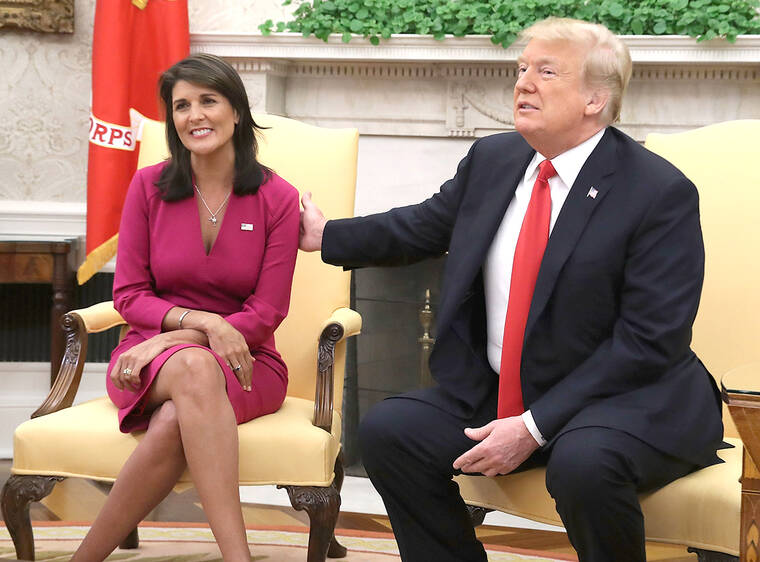Haley’s ambition Trumps principle: Getting back in line like too many Republicans
Of course Nikki Haley now says she’ll vote for Donald Trump. The blink of an eye ago she called him “unstable and unhinged,” an individual who’s “just toxic” and “lacks moral clarity.”
She follows the same beaten path of Marco Rubio, who became a big fan of the man he’d labeled a “dangerous” “con artist”; Ted Cruz, now an enthusiastic backer of a person he called a “sniveling coward”; and Lindsey Graham, now a leading apologist for the man he’d branded a “race-baiting, xenophobic, religious bigot.” In the political class, there are dozens upon dozens of other such examples amid rare exceptions like Mitt Romney.
Republicans who run for office speak the obvious truth about Donald Trump until they realize he’s got them beat and, if they want to win more elections in a party where Trump and Trumpism remain dominant, they have no choice but to turn obsequious and pretend that they never had a brain or a conscience. Trump proceeds to treat all these former rivals like something grosser than gum stuck to the bottom of his shoe, and that’s appropriate, because the rivals-turned-sycophants disrespect themselves.
When politicians so brazenly change their tune on such matters, it’s little wonder the public treats them with contempt; that contempt, ironically, is one of the things that in 2015 fueled the rise of a supposedly more authentic personality named Donald Trump.
The Republicans far more worth our attention these days are those who were up close and personal with Trump in his first term, who saw the way he operated as president, and who now warn at the top of their lungs against him becoming president again.
There’s former Vice President Mike Pence, who Trump tried to turn into an accomplice in his plot to overturn the 2020 election.
Former Trump Chief of Staff John Kelly, who emerged from the cauldron of the White House calling Trump “a person who admires autocrats and murderous dictators” who “has nothing but contempt for our democratic institutions, our Constitution, and the rule of law.”
There’s Bill Barr, once Trump’s attorney general, who calls Trump “a consummate narcissist” who “constantly engages in reckless conduct.” There’s chairman of the Joint Chiefs of Staff Mark Milley, who called Trump a “wannabe dictator.”
Former Defense Secretary Mark Esper, who calls Trump a “threat to democracy” based on his attempt to send as many as 250,000 troops to the U.S. Mexico border— as well as his apparent interest in launching missile strikes on Mexico. Former Defense Secretary Jim Mattis, who called Trump the “first president in my lifetime who does not try to unite the American people — does not even pretend to try.” That’s an unmistakably consistent pattern from those who saw him play commander-in-chief.
None of these people are seeking political office. All of them align with Trump on many key policy questions. All of them know that being honest about Donald Trump will make it harder for them to thrive professionally in a Republican Party where Trump has overwhelmingly positive approval ratings. Yet none can deny seeing what they saw: an immature, craven, self-serving, out-of-his depth individual who abused the power of the presidency for four years — then tried to steal a second four-year term — and is salivating at the opportunity to do it again.


